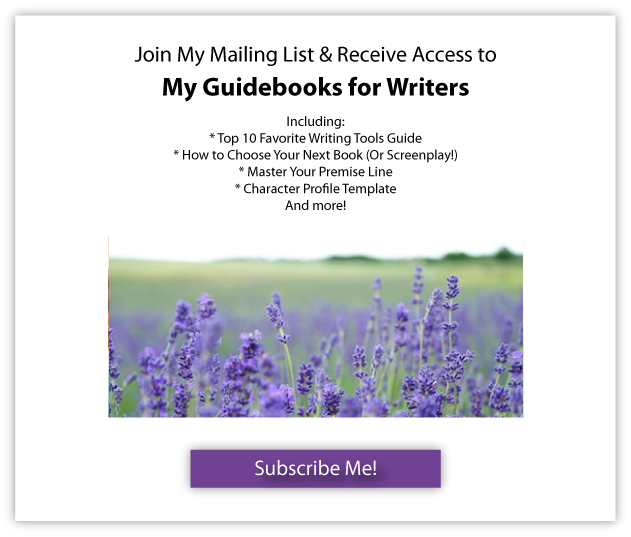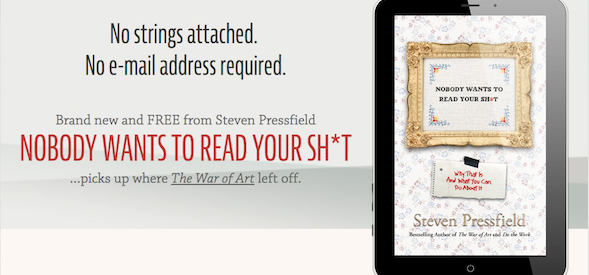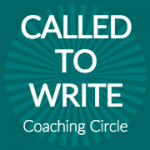Steven Pressfield has been among my greatest sources of inspiration since I committed myself to taking my call to write seriously.
Around that time, a friend suggested I read The War of Art.
It was life-changing.
Since then, I’ve continued to be deeply inspired and motivated by his other books including Do the Work, Turning Pro, The Authentic Swing, and his newest book, The Artist’s Journey (among others).
Steven’s work, his ideas, and his message have become a part of me. They’ve become a cornerstone for how I approach my writing practice, and what I do as a writing coach.
In fact, the core of what we offer at Called to Write could not be more perfectly aligned with The Artist’s Journey, both of which span the practical nuts and bolts of writing all the way to the more spiritual aspects of calling, destiny, and purpose.
Today I’m sharing 15 of my favorite quotes from his books, with the intention of inspiring you, as he has inspired me.
#1. “There’s a secret that real writers know that wannabe writers don’t, and the secret is this: It’s not the writing part that’s hard. What’s hard is sitting down to write. What keeps us from sitting down is Resistance.” ~ The War of Art
I have found this to be true, over and over. Every time I’m tempted to check something online or take care of something else first, it’s resistance. And this is what we do with my Called to Write Coaching Circle and my writing intensives — help writers overcome fear, doubt, and resistance, and sit down to write. Every day. For me, showing up to one of our daily writing sprints helps me press that inner “Go” button and get to work. Every time.
#2. “If you find yourself asking yourself (and your friends), ‘Am I really a writer? Am I really an artist?’ chances are you are. The counterfeit innovator is wildly self-confident. The real one is scared to death.” ~ The War of Art
I have very much found this to be true. Those who question their calling are the most likely to be truly called. I also find that a writer’s sense of identity is a byproduct of actually writing. In other words, once we’re writing, regularly, we feel like writers. And it’s surprising how little it takes to get to that place.
#3. “Are you paralyzed with fear? That’s a good sign. Fear is good. Like self-doubt, fear is an indicator. Fear tells us what we have to do. Remember our rule of thumb: The more scared we are of a work or calling, the more sure we can be that we have to do it.” ~ The War of Art
I also loved what I heard Steve say in an interview once, “Figure out what scares you the most and do that first.” Fear (and resistance) truly shows exactly where we need to grow. If there’s a place in your writing you’re experiencing resistance, look there first. That novel idea you’re avoiding, the story you’re longing to write but you’re scared you won’t be able to do justice? Go there.
#4. “The professional arms himself with patience, not only to give the stars time to align in his career, but to keep himself from flaming out in each individual work. He knows that any job, whether it’s a novel or a kitchen remodel, takes twice as long as he thinks and costs twice as much. . . [he] steels himself at the start of a project, reminding himself it is the Iditarod, not the sixty-yard dash. He conserves his energy. He prepares his mind for the long haul.” ~ The War of Art
Writing is very much about the long haul. Every screenplay I’ve embarked on has taken far longer than I’ve ever anticipated. I’ve learned now to catch myself when I start saying things like, “this will practically write itself!” and to recognize it as one of the many voices of resistance playing tricks with my mind.
#5. “Creative panic is good. Here’s why: Our greatest fear is our fear of success. When we are succeeding — that is, when we have overcome our self-doubt and self-sabotage, when we are advancing in our craft and evolving to a higher level — that’s when panic strikes. . . When we experience panic, it means we’re about to cross a threshold. We’re poised on the doorstep of a higher plane.” ~ Do the Work
“Threshold” is a perfect word here — there are transitions in each work where panic appears. When we’re closing in the on the end, when we’re pushing our envelope. It’s fascinating how that’s often the moment when things go awry and panic sets in. The most important thing is to not make it mean anything.
#6. “Start (Again) Before You’re Ready: I was living in a little town in northern California when I finally, after seventeen years of trying, finished my first novel. I drove over to my friend and mentor Paul Rink’s house and told him what I had done. ‘Good for you,’ he said. ‘Now start the next one.'” ~ Do the Work
I’ve always loved this concept, because it reminds me that this is a lifetime choice for me. I’m a writer. This means I will always be writing. So when I’m done with one, I celebrate it, but then I get going on the next.
#7. On writing “A Character Smarter Than I Am: I realized something I had already known: The part of our psyche that does the writing . . . is far deeper than our personal ego. That part is tapped into a course whose wisdom far exceeds our own. All we have to do is trust it.” ~ The Authentic Swing
Something I love about Steven Pressfield is his ability to bring in the reverence and awe of drawing on our greater, wiser selves with our writing. That even while we’re doing the “blue collar” work of writing, much like digging trenches and just showing up and putting in the time, we’re also resonating with the Muse on a higher plane. The work comes through us, when we let it.
#8. “Aspiring artists often kill their careers in the cradle by overworrying and overthinking. Don’t do it. … You discover who you are as you go along. What defines you is what you have done, but the weird part is you never know what that’ll be until you do it. The trick is: Do it.” ~ The Authentic Swing
Just do it. Just do the writing. And I don’t mean — “just write” — I still prefer to plot and plan my work. But writing is where the answers lie, pen to paper, fingers to keys, even if I’m dialoguing with myself, noodling to figure out what I’m doing. Thinking isn’t writing. I put words on the page to find out what I think, what I know, and who I am.
#9. “How Writing Works . . . The trick to writing, or to any creative endeavor, is that once you start, good things begin to happen. You can’t explain it. You don’t know why. An energy field is created by your love, your will, your devotion, your sweat. . . Trust it. Be brave.” ~ The Authentic Swing
Writing takes on a life of its own. Writing regularly brings a kind of self-sustaining momentum to it, once we get it going. That’s where the magic happens.
#10. “Before we turn pro, our life is dominated by fear and Resistance. We live in a state of denial. We’re denying the voice in our heads. We’re denying our calling. We’re denying who we really are. . . What changes when we turn pro is we stop fleeing.” ~ Turning Pro
Turning Pro is one of my favorite books of Steve’s. When I read it, I straighten up and get serious about my work, no matter whether I’m loving or hating it. I take it seriously.
#11. “When we turn pro, everything becomes simple. . . We now structure our hours not to flee from fear, but to confront it and overcome it. . . This changes our days completely. It changes what time we get up and it changes what time we go to bed. It changes what we do and what we don’t do.” ~ Turning Pro
Yes. Once we commit, we redesign and reconsider everything. We recognize the effort it takes to overcome the resistance, and design our writing lives to minimize that friction and get ourselves to the page as quickly and as easily as possible, each and every day.
#12. “The amateur believes that she must have all her ducks in a row before she can launch her start-up or compose her symphony or design her iPhone app. The professional knows better. . . Athletes play hurt. Warriors fight scared. The professional takes two aspirin and keeps on truckin’.” ~ Turning Pro
Although some might find the idea of writing hurt harsh, I’ve found that so many of the stories we tell ourselves about why we can’t write just aren’t true — and most especially those things we tell ourselves we have to have or have done first (like having more time, more money, better computers, or the bills paid, house clean, laundry done, kids off to college… you name it).
#13. “The artist on her journey confronts no foes that are not of her own creation. Her fear is her own. . . She has created them mentally. She can defeat them the same way.” ~ The Artist’s Journey
Most everything that stops us with our writing comes from within us. Our fears, our doubts, our excuses. Our addictions. (My experience is that grief may be an exception to this.) I love Steve’s point that we can defeat these the same way they are created.
#14. “On the artist’s journey, all strengths are mental. . . [and] are self-generated . . . all may be acquired by effort and force of will.” ~ The Artist’s Journey
Our strengths, just like our fears and doubts, come from within as well. We can learn resilience, patience, courage, and more.
#15. “An artist’s identity is revealed by the work she or he produces. Writers write to discover themselves… whether they realize it or not. But who is this self…? It is none other than the ‘second you’ — that wiser ‘you,’ that true, pure, waterproof, self-propelled, self-contained ‘you.'” ~ The Artist’s Journey
An underlying concept of the The Artist’s Journey is that our “second self,” the part of ourselves that is greater and wiser, is the one who writes. When we allow her to do so. I call this part our “essential self” — the part of us that remains when everything else (ego, personality, negative habits, limiting baggage) has been stripped away and we can step forward fully into ourselves and shine. Steve suggests that our role as artists is to move between our first and second selves, essentially “returning with the elixir” over and over again, as we write, even many times in day, and that the core of what we’ve been put here to do is to make that journey over and over again.
I love this.
If you’d like to check out these books for yourself, here are links to them on Amazon.com and Black Irish Books (Steve’s publishing company). The Amazon links are affiliate links, which means I earn a small commission if you click on them and purchase the books that way.
- The War of Art (Amazon | Black Irish Books)
- Do the Work (Amazon | Black Irish Books)
- Turning Pro (Amazon | Black Irish Books)
- The Authentic Swing (Amazon | Black Irish Books)
- The Artist’s Journey (Amazon | Black Irish Books)
![]()





 I’m leading a one-week intensive called “Fitting Writing Into Your Life: Becoming a Productive Screenwriter ” at Screenwriter’s University starting on August 11th and running for 7 days. It’s a three-part online recorded video presentation from me and plus online discussions, interaction, and support from me.
I’m leading a one-week intensive called “Fitting Writing Into Your Life: Becoming a Productive Screenwriter ” at Screenwriter’s University starting on August 11th and running for 7 days. It’s a three-part online recorded video presentation from me and plus online discussions, interaction, and support from me. 





